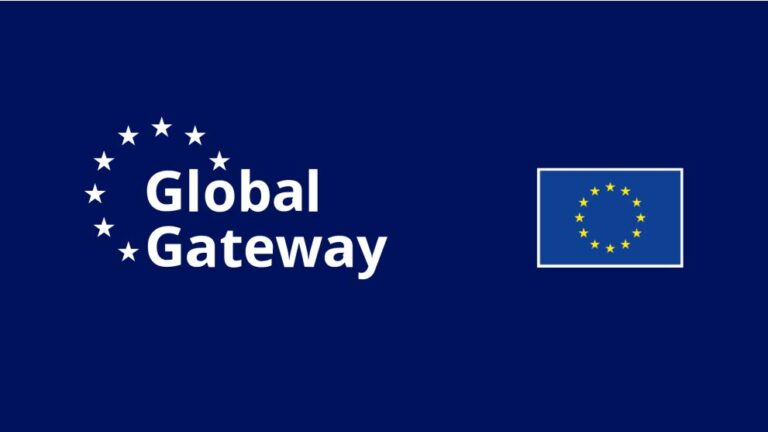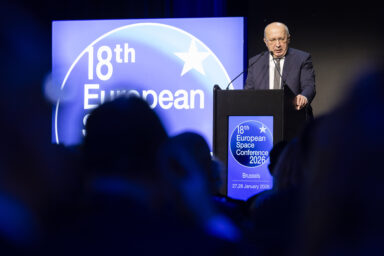As the EU seeks to position itself more strategically on the global stage, the Global Gateway initiative has emerged as a key instrument to promote sustainable infrastructure, strengthen partnerships, and bolster European competitiveness abroad. Questions remain, however, about whether the initiative is delivering concrete benefits to European companies. “In its early stages, it seemed like a rebranding exercise,” says expert Lara Muller.
Ms Muller is Public Sector Director at Invest International, a Dutch impact investor that helps business connect trade and development globally.
Global Gateway was launched with much fanfare, but at times it feels to me more like a showcase than anything else. Is that the case?
I think your impression is quite accurate—and many people share it. Global Gateway began a few years ago as some kind of European response to global shifts and other sponsored initiatives (e.g. the Chinese Belt and Road Initiatives). It meant to present ’the European way’ of doing things. But in its early stages, it seemed like a rebranding exercise: existing projects were simply relabeled as Global Gateway projects.
Can Global Gateway nonetheless still be of added value to European companies?
Yes, in principle, Global Gateway can give European companies access to strategic projects abroad, especially in areas such as sustainable infrastructure and coastal protection, where European expertise is strong.
But to achieve that, collaboration is key. If we want to make a meaningful impact, EU member states, partner countries, and the private sector must work together to develop infrastructure that reflects shared values: human rights, environmental protection, decent working conditions, and fair wages.
I strongly believe in a Team Europe approach. National governments, export credit agencies, development banks, and businesses should jointly identify promising projects. The European Commission should act as a facilitator and coordinator, not as a micromanager. But crucially, this also requires serious funding and risk-mitigation instruments.
You might be interested
What have been the main obstacles for companies to fully benefit from Global Gateway so far?
The main obstacle has been financing. Too little funding and too little risk mitigation instruments have actually been made available. Europe has not yet ‘put its money where its mouth is.’
Many European companies are withdrawing from markets such as on the African continent. They simply don’t get enough risk-mitigating capital, guarantees, and insurance to compete with state-backed firms that arrive with financing, guarantees, and technology already secured.

On top of that, investment hubs and funding mechanisms have been launched with good intentions, but their design often reflects a Brussels-centric, bureaucratic logic. A big issue is the reliance on open calls for proposals. That might work when it comes to public knowledge or research, but not in a competitive commercial environment. These companies are competing with one another.
Once a proposal has been submitted, the process becomes a black box for companies. There is little clarity on intellectual property protection or evaluation procedures. That is not an attractive proposition for competitive commercial firms.
Another structural issue is Europe’s regulatory burden. There’s a saying: “Europe is regulating itself out of business.” Excessive micromanagement slows processes down without necessarily improving outcomes. We need to operate more on the basis of trust and broad frameworks.
European companies globally often struggle to compete on price. Instead, as experts are also saying during this event, they should compete on other factors, such as quality and sustainability. Is that a realistic alternative?
European companies cannot indeed realistically compete on price alone with state-backed enterprises from China, India, Korea, or Japan. But they can compete on quality, sustainability, and innovation—provided the right framework is in place. And I think that’s really what Global Gateway is fundamentally about: creating a level playing field for European countries on a global scale.
Europe can build win-win situations: European companies can compete on the basis of quality, sustainability, and Environmental, Social, and Governance standards (ESG); on the other, partner countries gain access to innovation, advanced technologies, and better ways of doing things. Take for example a project like coastal protection in Mozambique. European companies can really excel in that, securing a coastline and improving livelihoods.
But in order for this to work, technical assistance is also needed so partner countries have the capacity to assess quality properly. If we want quality-based competition to work in practice, we must invest in strengthening procurement and administrative capacities in partner countries. Larger budgets are needed so that European engineers and consultancies can support local governments in applying quality- and sustainability-oriented tendering rules.
You also mentioned the regulatory burden. In that respect, do you welcome the Commission’s recent omnibus proposals?
I do welcome the omnibus proposals. I strongly believe in making the definition of sustainability more objective, so that investors and financial institutions have a clear basis for comparison and can make informed decisions about where to invest. But applying the same amount of objectives and regulations approach is not always suited for investing outside of Europe.
Applying the full EU due diligence regulations and its reporting obligations to projects in Africa or Asia and imposing heavy administrative burdens on institutions like the World Bank, slows things down a lot.
In that sense, the omnibus proposals represent a form of deregulation in response to widespread complaints from companies about the sheer volume and layering of rules, particularly on reporting, which has become a real obstacle. That said, we need to strike the right balance. We can’t completely deregulate, history has shown why that doesn’t work, but we do need to find a better balance between competitiveness and regulation.
Some businesses have argued that the omnibus proposals, while simplifying in some areas, also create uncertainty by moving away from the clarity the previous due diligence frameworks provided. How do you look at this?
Omnibus is not perfect, that’s true. When I speak with governments in Africa, they certainly don’t want 28 different rulebooks from 28 EU member states. This is precisely where the European Commission can play a key role: by ensuring uniformity and harmonisation of ESG and due diligence rules, so that each international financial institution doesn’t apply its own separate framework.
At Invest International, we’ve already agreed with several institutions to simply rely on each other’s ESG due diligence. If, for example, the World Bank has already conducted its checks, we accept them, we don’t redo the entire process. That prevents unnecessary duplication and confusion, which is a large burde on companies.
This kind of practical alignment is essential to make the system workable. Competing on quality only functions if the regulatory environment is streamlined and if partner countries have the capacity to apply these frameworks effectively.
Tying Global Gateway to the broader competitiveness debate—can it become an effective tool to boost the EU’s global position?
It has the potential to be, but only if financing, risk-mitigation, and regulatory coherence improve. If Global Gateway remains primarily a branding exercise without substantial financial backing or operational agility, it will not deliver on its strategic ambitions.
But if the EU manages to align member states, simplify procedures, and offer competitive financial instruments, Global Gateway can indeed help European companies compete globally on the basis of quality and sustainability.
So all in all, what do European companies need from the EU to fully benefit from Global Gateway?
Three things. Clarity: companies need to know what Global Gateway actually offers. On top of that, companies need financing and guarantees: strong instruments are essential to reduce risks and enable firms to compete internationally. And another important thing is diplomatic support: European companies are often left to navigate complex environments alone. Team Europe should include diplomats, financiers, and businesses working together to ensure safe, transparent, and corruption-free conditions on the ground. That’s where the EU can make a real difference.











